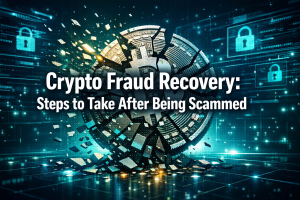Table of Contents
Cryptocurrency scams have become a significant threat to investors, with fraudulent activities ranging from fake ICOs to phishing attacks. The decentralized nature of the crypto industry makes it challenging for victims to recover their lost money.
The recovery of funds lost to such scams is a complex process. Victims often face significant hurdles in reclaiming their assets due to the anonymity provided by blockchain technology.
Understanding the available options is crucial. This guide will walk you through the steps to take after discovering you’ve been scammed, how to document evidence, and which authorities to contact to potentially recover your lost funds.
Understanding the Cryptocurrency Scam Landscape
The world of cryptocurrency is plagued by sophisticated scams that target both novice and experienced investors. As the crypto market continues to grow, so does the complexity and variety of these scams.
Common Types of Cryptocurrency Scams
Cryptocurrency scams come in various forms, each designed to deceive and exploit unsuspecting victims. Some common types include:
- Fake Exchanges and fraudulent initial coin offerings (ICOs) that promise high returns but disappear with investors’ funds.
- Pig Butchering scams, where scammers build trust over time before executing their fraudulent plans.
- Crypto ATMs and phishing attacks that trick victims into revealing their private keys or login credentials.
- Blackmail and extortion schemes that leverage the anonymity of cryptocurrency transactions.
These scams often involve elaborate setups, including fake websites and testimonials, to appear legitimate. Understanding these tactics is crucial for investors to protect themselves.
Why Crypto Scams Are Difficult to Trace
Crypto scams are particularly challenging to trace due to the inherent characteristics of blockchain technology. The pseudonymous nature of cryptocurrency transactions, combined with the ability to conduct cross-border transactions, makes it difficult for authorities to track scammers. Additionally, the use of mixing services and other obfuscation techniques further complicates the tracing process.
By understanding the technical aspects of how scammers operate, victims can better navigate the recovery process. This knowledge also highlights why conventional recovery methods often fall short in the face of sophisticated crypto scams.
Recognizing You’ve Been Scammed: Warning Signs and Confirmation
Crypto scams often masquerade as legitimate investment opportunities, but there are signs to watch out for. Investors must be vigilant and cautious when dealing with cryptocurrency transactions.
Red Flags That Indicate a Crypto Scam
Several warning signs can indicate a crypto scam. Promises of guaranteed or unusually high returns with little or no risk should trigger skepticism. Legitimate crypto investments always carry risk and volatility. Scammers often use pressure tactics to urge immediate action or investment before a “limited opportunity” expires. Unprofessional communication, including grammatical errors or generic email addresses, is another red flag.
- Be wary of promises that seem too good to be true.
- Watch out for pressure to invest quickly.
- Check for unprofessional communication.
Steps to Verify If You’ve Been Scammed
To verify if you’ve been scammed, attempt to withdraw small amounts from the platform. You can also search for the company on regulatory warning lists and consult blockchain explorers to trace transaction histories. Social media profiles and online communities can provide valuable information about potential scams, as other victims often share their experiences.
| Verification Step | Description |
|---|---|
| Withdraw Small Amounts | Test the platform’s legitimacy by withdrawing a small amount. |
| Check Regulatory Lists | Search for the company on regulatory warning lists. |
| Blockchain Explorers | Use blockchain explorers to trace transaction histories. |

Immediate Actions to Take After Falling Victim to a Crypto Scam
The moment you realize you’ve been scammed in the crypto space, swift action is crucial. Acting quickly can significantly impact your ability to recover stolen funds.
Documenting the Scam Details
Document all details of the scam meticulously. This includes screenshots of the platform, communication with scammers, transaction IDs, wallet addresses, and any promotional materials that enticed your investment. Detailed records will be essential for reporting and potential recovery efforts.
Reporting to Relevant Authorities
Report the incident to relevant authorities, including local police, the FBI’s Internet Crime Complaint Center (IC3), the Financial Conduct Authority, the CFTC, and the SEC. Providing them with your documented evidence will help agencies track frauds and pursue the fraudsters.
Securing Your Remaining Assets
Immediately change passwords and enable two-factor authentication on all accounts. Consider transferring funds to a new hardware wallet if you suspect your current security has been compromised. This will help secure your remaining crypto assets.
| Action | Purpose |
|---|---|
| Document scam details | Essential for reporting and recovery |
| Report to authorities | Helps track and pursue fraudsters |
| Secure remaining assets | Protects your crypto assets from further loss |
Self-Help Recovery Methods: What You Can Try First
Before investing in professional services, it’s crucial to explore cost-effective self-help recovery methods for crypto scam victims. These methods can sometimes yield results, especially for less sophisticated scams.
Contacting Cryptocurrency Exchanges
Contacting cryptocurrency exchanges where your funds were transferred is a crucial step. Major exchanges have anti-fraud teams that can freeze accounts with sufficient evidence of theft.

Blockchain Analysis Tools for Tracing Funds
Utilize blockchain analysis tools like Chainalysis, CipherTrace, and Elliptic to trace the movement of stolen cryptocurrency. These tools help identify when funds reach centralized exchanges where they might be frozen.

Negotiation Attempts with Scammers
In some cases, negotiation attempts with scammers can be effective, particularly if they fear legal consequences. Carefully crafted negotiations might recover some of your lost cryptocurrency.
Documenting all self-help recovery attempts is essential, as this evidence will strengthen your case if you later decide to pursue professional recovery services or legal action.
Professional Crypto Scam Recovery Services: What to Expect
Victims of cryptocurrency scams are not alone; professional recovery services have emerged to help them trace and potentially recover their stolen assets. These services combine legal expertise, blockchain technology, and cybersecurity skills to tackle the complex issue of cryptocurrency scams.
How Legitimate Recovery Services Work
Legitimate crypto scam recovery services begin with a thorough case evaluation to determine the feasibility of recovery. This involves analyzing transaction patterns, understanding scammer methodologies, and considering jurisdictional factors. Advanced blockchain analysis is then used to trace the movement of funds, identify perpetrators, and gather evidence for potential legal proceedings.
Typical Recovery Process and Timeframes
The recovery process can vary significantly in duration, from several weeks to many months, depending on the complexity of the case. Recovery specialists work closely with law enforcement agencies, financial institutions, and cryptocurrency exchanges to expedite the freezing and potential return of stolen assets. Fee structures among legitimate services vary, with models including hourly rates, flat fees, or contingency arrangements.
For those who have lost money to cryptocurrency scams, seeking professional help can be a crucial step towards recovery. It’s essential to choose a reputable service with a proven track record in fraud recovery and a transparent approach to their processes and fees.
Beware of Recovery Scams: Double Victimization
Recovery scams prey on individuals who have already been victimized by crypto scams, making them double victims. The promise of recovering lost funds can be enticing, but it’s often a ruse to extract more money or sensitive information from unsuspecting victims.

Warning Signs of Fraudulent Recovery Services
Fraudulent recovery services often exhibit certain red flags. Be cautious of services that claim guaranteed results, promising to recover 100% of lost funds. Legitimate services acknowledge the challenges involved in crypto recovery.
- Demand upfront payments, especially in cryptocurrency, wire transfers, or gift cards.
- Contact you unsolicited through email, social media, or messaging apps.
As emphasized by experts, “legitimate services typically offer free initial consultations and have transparent fee structures.”
How to Verify a Recovery Service’s Legitimacy
To avoid falling prey to recovery scams, it’s crucial to verify the legitimacy of a recovery service. Check for proper business registration and professional credentials. A legitimate service will have a physical office location and verifiable case histories.
- Reviews across multiple platforms and detailed testimonials can provide insight.
- Request references from past clients who have successfully recovered funds.
Legal Options for Crypto Scam Recovery
The legal landscape for crypto scam recovery is multifaceted, offering various paths for victims to reclaim their assets. Our cryptocurrency recovery lawyers have extensive experience in navigating the legal complexities surrounding crypto fraud cases.
Working with Law Enforcement Agencies
Working with law enforcement agencies like the FBI and Secret Service can be effective for large-scale scams. These agencies prioritize cases involving substantial losses or numerous victims.
Civil Litigation Possibilities
Civil litigation through asset freezing orders and tracing claims can be powerful tools when the scammer’s identity or location is known. This allows victims to potentially recover funds through court-ordered remedies.
International Legal Challenges
International legal challenges include jurisdictional conflicts and varying cryptocurrency regulations. Specialized legal expertise is required to navigate these complexities and enforce judgments across borders.
Case Studies: Successful Crypto Scam Recoveries
Successful crypto scam recoveries demonstrate that reclaiming stolen funds is possible with the right approach. By examining real-world cases, victims can gain valuable insights into effective recovery strategies.
Recovery Through Exchange Cooperation
In a notable case, a victim who lost $75,000 in Bitcoin to a fake investment platform recovered 80% of their funds. This was achieved by quickly reporting the theft to the exchange where the scammers attempted to convert the cryptocurrency to fiat currency. Prompt action and cooperation with the exchange were crucial in this successful recovery.
Law Enforcement Intervention Success Stories
Law enforcement intervention proved crucial in a major recovery case involving a social media investment scam. FBI coordination with international authorities led to the seizure of over $12 million in stolen crypto assets from multiple victims. This case highlights the importance of reporting scams to law enforcement agencies, which can lead to significant recoveries through their investigations and interventions.
Private Investigation Recoveries
Private investigation firms specializing in blockchain forensics have achieved remarkable results in several high-profile cases. For instance, they successfully traced and recovered funds from sophisticated mixing services used by criminals to obscure transaction trails. 
- Examining real-world case studies provides insights into effective recovery strategies.
- Quick reporting and cooperation with exchanges can lead to significant recoveries.
- Law enforcement intervention is crucial in cases involving large-scale scams.
Conclusion: Building a Strategic Approach to Crypto Scam Recovery
Navigating the complex process of crypto scam recovery demands expertise and swift action. If you’ve been the victim of a crypto scam, time is of the essence. The longer you wait to take action, the more difficult it becomes to trace and recover your stolen funds.
Building an effective crypto scam recovery strategy requires a multi-faceted approach, combining immediate action, thorough documentation, and careful consideration of recovery options. The recovery journey often begins with self-help methods and may escalate to professional services or legal action, depending on the complexity of the case and the amount lost.
Prevention remains the most effective strategy against crypto scams, with ongoing education about emerging scam techniques and robust security practices being essential protections. As the cryptocurrency world continues to mature, recovery mechanisms will likely improve. For now, victims must navigate a complex landscape requiring both technical knowledge and legal expertise to maximize recovery chances.
Trust the professionals to guide you through the complex process of cryptocurrency recovery. With innovative strategies and advanced technology, we’re here to help you navigate the challenges of the cryptocurrency world and protect your investments.
FAQ
What are the most common types of cryptocurrency scams?
The most common types of cryptocurrency scams include phishing attacks, investment scams, and fake cryptocurrency exchanges. These scams often involve scammers creating fake websites, emails, or social media profiles to trick victims into divulging sensitive information or transferring funds.
How can I verify if I’ve been a victim of a cryptocurrency scam?
To verify if you’ve been scammed, check for red flags such as unsolicited investment opportunities, promises of high returns, or requests for sensitive information. You can also review your transaction history and monitor your accounts for suspicious activity.
What should I do immediately after falling victim to a cryptocurrency scam?
After being scammed, document the scam details, including dates, times, and amounts. Report the incident to relevant authorities, such as the Financial Conduct Authority, and secure your remaining assets by updating your passwords and enabling two-factor authentication.
Can I recover my lost cryptocurrency funds without professional help?
Yes, you can try self-help recovery methods, such as contacting cryptocurrency exchanges, using blockchain analysis tools, or attempting to negotiate with scammers. However, these methods may not always be successful, and professional help may be necessary.
How do legitimate recovery services work?
Legitimate recovery services typically involve a thorough investigation, tracing of funds, and negotiation with scammers or exchanges. These services often have expertise in blockchain technology and work with law enforcement agencies to recover lost funds.
What are the warning signs of fraudulent recovery services?
Warning signs of fraudulent recovery services include promises of guaranteed recovery, upfront fees, and lack of transparency. Be cautious of services that claim to have insider connections or use high-pressure sales tactics.
Can I take legal action against cryptocurrency scammers?
Yes, you can take legal action against cryptocurrency scammers, including working with law enforcement agencies, civil litigation, or international legal challenges. However, the success of these actions depends on various factors, including the jurisdiction and the scammer’s identity.









